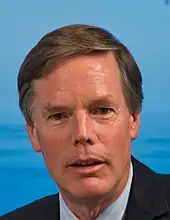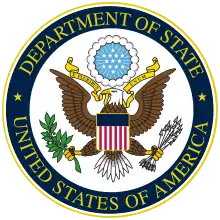R. Nicholas Burns
R. Nicholas Burns (born January 28, 1956) is a university professor, columnist, lecturer and former American diplomat. He is currently Professor of the Practice of Diplomacy and International Politics at Harvard's John F. Kennedy School of Government and a member of the Board of Directors of the school's Belfer Center for Science and International Affairs. At the Harvard Kennedy School, he is director of The Future of Diplomacy Project and Faculty Chair for the programs on the Middle East and India and South Asia. He is Director of the Aspen Strategy Group, senior counselor at The Cohen Group and serves on the Board of Directors of Entegris, Inc. He writes a bi-weekly column on foreign affairs for The Boston Globe and is a senior foreign affairs columnist for GlobalPost. He also serves on the Board of Directors of the Atlantic Council,[1] the Council on Foreign Relations, Special Olympics, the Rockefeller Brothers Fund, the Appeal of Conscience Foundation, the Center for the Study of the Presidency and Congress, American Media Abroad, the Gennadius Library and the Richard Lounsbery Foundation. Burns was in 2020 a Fulbright scholar at Queen Mary University of London and contributor to the New Statesman.[2]
Nick Burns | |
|---|---|
_Official_portrait_of_R._Nicholas_Burns%252C_Under_Secretary_for_Political_Affairs_(Photographer-_Ann_Thomas--State)_(59-CF-DS-24774-05_Burns_Nick_fromPSD._-_DPLA_-_f4243003ba9e37e05b4cd2e0e77a3e8d.jpg.webp) | |
| Under Secretary of State for Political Affairs | |
| In office March 18, 2005 – February 29, 2008 | |
| President | George W. Bush |
| Preceded by | Marc Grossman |
| Succeeded by | Bill Burns |
| United States Ambassador to NATO | |
| In office August 7, 2001 – March 7, 2005 | |
| President | George W. Bush |
| Preceded by | Sandy Vershbow |
| Succeeded by | Victoria Nuland |
| United States Ambassador to Greece | |
| In office December 22, 1997 – July 29, 2001 | |
| President | Bill Clinton George W. Bush |
| Preceded by | Thomas Niles |
| Succeeded by | Thomas Miller |
| Spokesperson for the United States Department of State | |
| In office 1995–1997 | |
| President | Bill Clinton |
| Preceded by | Mike McCurry |
| Succeeded by | James Rubin |
| Personal details | |
| Born | January 28, 1956 Buffalo, New York, U.S. |
| Spouse(s) | Elizabeth Baylies |
| Children | 3 |
| Education | Boston College (BA) Johns Hopkins University (MA) |
Burns is vice chairman of the American Ditchley Foundation and serves on the Panel of Senior Advisors at Chatham House, the Royal Institute of International Affairs. During his career in the State Department, he was United States Under Secretary of State for Political Affairs within the United States Department of State. Appointed by President George W. Bush, he was confirmed by the U.S. Senate on March 17, 2005, and was sworn into office by Secretary of State Condoleezza Rice. As Under Secretary, he oversaw the bureaus responsible for U.S. policy in each region of the world and served in the senior career Foreign Service position at the Department. He retired on April 30, 2008. He was a Visiting Scholar at the Woodrow Wilson Center in Washington D.C. in summer 2008. In July 2009, Burns joined The Cohen Group, a consulting firm in Washington D.C, as a senior counselor.
Personal life
Burns was born in Buffalo, New York, and raised in Wellesley, Massachusetts. He and his wife Elizabeth A. Baylies have three daughters: Sarah, Elizabeth and Caroline.
Education
Burns attended Wellesley High School,[3] and studied abroad in Luxembourg in 1973 with the American Field Service Program. He is a 1978 graduate of Boston College where he earned a B.A. in History concentrating on European History and the Certificat Pratique de Langue Française during his junior year at the University of Paris (Sorbonne). He received a master's degree from Johns Hopkins School of Advanced International Studies in 1980 in International Relations concentrating on International Economics, American Foreign Policy and Africa.
He speaks French, Arabic, and Greek as well as English.
Awards
Burns has received fifteen honorary degrees, the Presidential Distinguished Service Award, the Secretary of State’s Distinguished Service Award, the 2017 Ignatian Award from Boston College, 2016 New Englander of the Year from the New England Council, the Woodrow Wilson Award for Public Service from the Johns Hopkins University, the Boston College Alumni Achievement Award, the Jean Mayer Global Citizenship Award from Tufts University, and the Trainor Award for Diplomacy by Georgetown University. He was named Communicator of the Year by the National Association of Government Communicators in 1997.
Career


Before entering the Foreign Service, Mr. Burns worked as program officer at A.T. International, a nonprofit organization specializing in economic assistance for Third World countries.
Burns began his Foreign Service career in Africa and the Middle East. He was an intern at the U.S. Embassy in Nouakchott, Mauritania, Vice Consul and Staff Assistant to the Ambassador in Cairo, Egypt, from 1983 to 1985, and then political officer at the American Consulate General in Jerusalem from 1985 to 1987, where his second daughter Elizabeth was born in 1986. In this position, he coordinated U.S. economic assistance to the Palestinian population in the West Bank, including East Jerusalem.
Under President George H. W. Bush, he was director for Soviet (and then Russian) affairs. During this time, he attended all U.S.–Soviet summits and numerous other international meetings and specialized on economic assistance issues, U.S. ties with Russia and Ukraine, and relations with the Baltic countries. He was a member of the Department's Transition Team in 1988, and served as Staff Officer in the Department's Operations Center and Secretariat in 1987-1988.
Burns served for five years (1990–1995) on the National Security Council staff at the White House. He was Special Assistant to President Bill Clinton and Senior Director for Russia, Ukraine, and Eurasia Affairs. He had lead responsibility in the White House for advising the President on all aspects of U.S. relations with the fifteen countries of the former Soviet Union.
From 1995 to 1997, Burns was Spokesman of the Department of State and Acting Assistant Secretary for Public Affairs for Secretary of State Warren Christopher and Secretary Madeleine Albright. In this position, he gave daily press conferences on U.S. foreign policy issues, accompanied both Secretaries of State on all their foreign trips and coordinated all of the Department’s public outreach programs.
From 1997 to 2001, Burns was U.S. Ambassador to Greece. During his tenure as Ambassador, the U.S. expanded its military and law enforcement cooperation with Greece, strengthened their partnership in the Balkans, increased trade and investment and people-to-people programs.
Burns supported the 2003 invasion of Iraq.[4] Prior to his final assignment, Burns was the United States Permanent Representative to the North Atlantic Treaty Organization. As Ambassador to NATO, he headed the combined State-Defense Department U.S. Mission to NATO at a time when the Alliance committed to new missions in Iraq, Afghanistan and the global war against terrorism, and accepted seven new members.
On January 18, 2008, Burns announced his retirement from the Foreign Service effective March 2008. The reason cited was to go back to family concerns and to pursue other opportunities outside of government.[5][6] A White House press statement stated that Burns would continue to serve in an advisory capacity as the United States Special Envoy in finalizing the United States-India Peaceful Atomic Energy Cooperation Act.
After leaving government service Burns started working for the Cohen Group, a consultancy and lobbying organization for arms manufacturers. The consultancy which professes to be, “exten[d] internationally where our Principals have developed great expertise and relationships with key political, economic and business leaders” has practice groups in Aerospace and Defense, Biotechnology and Pharmaceuticals, CFIUS, FOCI & Industrial Security, Energy & Resources, Financial Services & Investment, Healthcare & Life Sciences, Homeland Security, International Trade & Agriculture, Real Estate & Property Development, Strategic Communications & Message Development, Telecom, Media & Technology, and Transportation & Logistics."[7]
At the Harvard Kennedy School, Burns is teaching courses in diplomacy, American foreign policy, and international politics. He is a strong advocate for diplomacy, and has argued that the United States "should make a very strong effort to get to the negotiating table with Iran."[8] Burns is also an active speaker on the lecture circuit and in 2013 gave the lecture at the year's installment of the Waldo Family Lecture Series on International Relations at Old Dominion University.[9]
Burns said that NSA whistleblower Edward Snowden is a traitor: "He went to China and Russia. That is why I dislike Snowden."[4] On the 2012 Benghazi attack, Burns defended Secretary of State Clinton, saying "I find it distasteful that Benghazi has been politicized."[4] He endorsed Hillary Clinton's campaign for president.[4]
Burns is currently a foreign policy adviser in Joe Biden's 2020 Presidential Campaign, and was an informal adviser to Hillary Clinton’s 2016 campaign. Burns was hired by Antony Blinken, Biden’s long-time foreign policy advisor in the Senate and his National Security Adviser as Vice President from 2009 - 2013. As a Bush advisor Burns supported the Iraq War, though today he calls it “a pretty serious blunder” He is also the Director of the Aspen Strategy Group, a forum of establishment foreign policy thinkers.[10]
Burns has also consulted and given paid speeches for the employees of Goldman Sachs, Bank of America, State Street, CitiBank, Honeywell, and a number of other companies, universities, and associations.”[10]
Memberships
Burns is a member of the Council on Foreign Relations, The Trilateral Commission, American Academy of Diplomacy, The American Academy of Arts and Sciences, Order of St. John, America Abroad Media advisory board,[11] and is a lifelong member of Red Sox Nation.[12]
References
- "Board of Directors". Atlantic Council. Retrieved 2020-02-11.
- "Nick Burns". New Statesman. Retrieved November 24, 2020.
- Charles Truehart (Winter 2003). "The diplomat". Boston College Magazine.
- "Speaking in Sturbridge, former diplomat Nicholas Burns says China poses biggest challenge for US". Telegram & Gazette. October 22, 2015.
- Janine, Zacharia; Viola Gienger (2008-01-18). "Burns, Rice's Point Man on Iran and India Talks, to Resign Post". Bloomberg. Retrieved 2008-01-18.
- "Announcement of Departure of Under Secretary of State for Political Affairs R. Nicholas Burns". U.S. Department of State. 2008-01-18. Retrieved 2008-01-18.
- "What We Do". The Cohen Group. Retrieved 2020-08-12.
- "Q&A with Nicholas Burns". Belfer Center for Science and International Affairs, Harvard Kennedy School. Winter 2008–2009. Retrieved 2008-10-30.
- "Waldo Family Lecture Series on International Relations Digital Collection". Old Dominion University. Retrieved July 17, 2017.
- Grim, Ryan (2019-07-24). "Joe Biden's New Foreign Policy Adviser Supported Iraq War and Dubbed Edward Snowden a "Traitor"". The Intercept. Retrieved 2020-08-12.
- "Advisory Board - Nick Burns". America Abroad Media. 2011. Archived from the original on January 25, 2013.
- "R. Nicholas Burns". U.S. Department of State.
External links
| Wikimedia Commons has media related to R. Nicholas Burns. |
- Burns' bio at Harvard Kennedy School's Belfer Center
- US diplomat calls for Iran action
- 'Victorious' Kazakhs Told To Wait On OSCE Decision
- Appearances on C-SPAN
| Diplomatic posts | ||
|---|---|---|
| Preceded by Thomas Niles |
United States Ambassador to Greece 1997–2001 |
Succeeded by Thomas Miller |
| Preceded by Sandy Vershbow |
United States Ambassador to NATO 2001–2005 |
Succeeded by Victoria Nuland |
| Political offices | ||
| Preceded by Marc Grossman |
Under Secretary of State for Political Affairs 2005–2008 |
Succeeded by Bill Burns |
